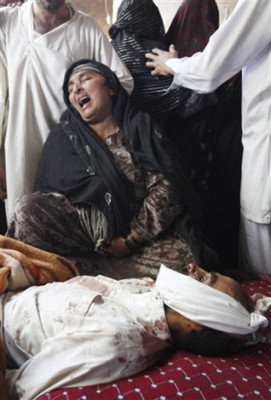Voice of Russia, May 29, 2012
Civilian deaths in Afghanistan continue unchecked
By John Robles

May 1, 2012: Afghan villagers stand around the bodies of loved ones who were allegedly killed in an Afghan-led operation in Laghman east of Kabul, Afghanistan. NATO says a Taliban leader and another insurgent were killed after they opened fire on security forces taking part in an Afghan-led operation in the eastern province of Laghman. (Photo: Rahmat Gul/AP)
In Eastern Afghanistan on Saturday night NATO was involved in another “incident”, as NATO calls them, involving the deaths of large numbers of civilians. This time NATO forces killed a family of eight people, including six children, in the Paktia province.
Many experts say the “incident” threatens to further strain the already tense relationship between President Hamid Karzai and his Western backers. Some analysts claimed Karzai’s recent trip to the NATO Summit in Washington served to slightly smooth the already tense relationship but this latest incident may cause another wave of violence in the country and force Karzai to have to take stronger steps against the “occupiers”.
According to a local government spokesperson in an interview with the AFP the eight people were killed in a NATO air strike and included a husband and wife and their six children.
The official, one Rohulla Samouni, stated that none of the members of the family had ties with the Taliban or other terrorist group. He said NATO aircraft bombed a house. A man named Mohammad Sahfi his wife and their six innocent children were brutally murdered.
— There have been many similar such cases in 2012 in Afghanistan. For example on February 17, 2012, six civilians, including a woman and a child were killed in a NATO night raid in Dewa Gul Valley, in the Chawki district of Kunar province.
—Then on February 8, seven children and a young adult were killed in a NATO airstrike in the village of Geyaba in the eastern Afghan province of Kapisa.
—March 11, 2012 saw at least 16 civilians, including women and children killed after a 'rogue' US serviceman entered their homes murdered them.
The War in Afghanistan has already lasted for more than 10 years (2001–present) and killed tens of thousands of Afghan civilians directly as well as the deaths of tens of thousands more indirectly as a consequence of displacement, starvation, disease, exposure, lack of medical treatment, crime and lawlessness resulting from the war.
President Hamid Karzai has summoned foreign military commanders and made public statements to warn of the consequences of further Afghan civilian deaths many times.

May 1, 2012: An Afghan woman mourns over the body of her son, Abdul Satar, who was allegedly killed in an Afghan-led operation in Laghman, east of Kabul. (Photo: AP)
—"We are not happy. We don't want any more Afghan civilian casualties." "This must not occur again." President Hamid Karzai, July 2002
—"I don’t think there is a big need for military activity in Afghanistan anymore." "Similarly, going into the Afghan homes – searching Afghan homes without the authorization of the Afghan government – is something that should stop now." President Hamid Karzai, September 2005
—In May 2006, Afghan President Hamid Karzai summoned the commander of U.S. forces in Afghanistan, Lt. Gen. Karl Eikenberry, to demand an explanation for the deaths of at least 16 Afghan civilians during air strikes.
—In December 2006, a tearful President Hamid Karzai gave a heartfelt speech that brought audience members to tears, Karzai said the cruelty imposed on his people "is too much" and that Afghanistan cannot stop "the coalition from killing our children."
—"Five years on, it is very difficult for us to continue accepting civilian casualties. It is becoming heavy for us; it is not understandable anymore." "We are very sorry when the international coalition force and NATO soldiers lose their lives or are injured. It pains us. But Afghans are human beings, too." President Hamid Karzai, May 2, 2007
—In June 2007, after the deaths of more than 90 civilians in 10 days, President Hamid Karzai accused ISAF and the US-led military coalition in his country of "extreme" and "disproportionate" use of force.
—"Afghan life is not cheap and it should not be treated as such." "Several times in the last year, the Afghan government tried to prevent civilian casualties, but our innocent people are becoming victims of careless operations of NATO and international forces." President Hamid Karzai, June 23, 2007
—On October 28, 2007, in an interview on 60 Minutes, Hamid Karzai stated that he had explicitly asked U.S. President George W. Bush to roll back the use of air strikes, which had killed more than 270 civilians in 17 air strikes to date in 2007 alone.
— In August 2008, President Hamid Karzai ordered a review of foreign troops in Afghanistan after 96 civilians were killed in an air strike in Herat.
—"The continuation of civilian casualties can seriously undermine the legitimacy of fighting terrorism and the credibility of the Afghan people's partnership with the international community." President Hamid Karzai, September 24, 2008
— On November 5, 2008, Afghan President Hamid Karzai asked U.S. President-elect Barack Obama to put an end to civilian casualties in Afghanistan after an air strike on a wedding party, killing 37 people, including 23 children and 10 women.
— In April 2009, American-led military forces killed 5 civilians, including two children and a nine-month-old baby, in a U.S. night raid in Khost province
—In March 2011, Karzai rejected American President Obama's and Gen. David Petraeus' apologies for the killing of 9 Afghan boys ages 7–13 who were collecting firewood. "The apology is not enough," Karzai said
— In May 2011, Karzai issued a "final warning" as more civilians were killed in NATO airstrikes. He said the Afghan people can no longer tolerate the attacks, and that the U.S.-led coalition risks being seen as an "occupying force".
The killings go on.
Characters Count: 7490
